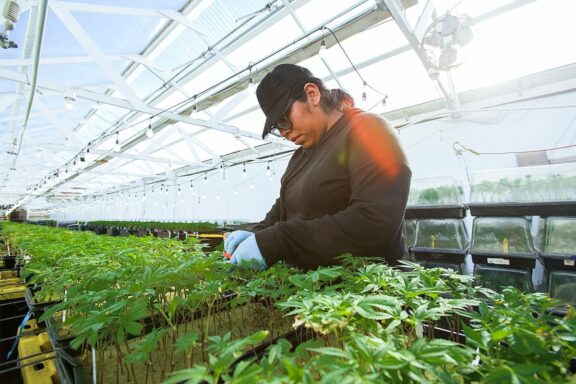
CannaConnect is the Department of Cannabis Control’s (DCC) resource hub, here to help license holders get the tools & support they need to maintain compliance and thrive.
Latest updates
SB 540 retailer requirements
On and after March 1, 2025, a retailer, or microbusiness with listed retail activities, shall display this brochure, including printed copies, at the point of sale or final delivery in person and online at time of online purchases and offer each new consumer a copy of the brochure.
Cannabis products that could be attractive to children are prohibited
Licensees that engage in advertising, marketing, manufacturing, packaging, or labeling cannabis or cannabis products in a manner that is determined to be attractive to children may be subject to citations and fines, license suspension, license denial, and license revocation. The following FAQs outline what to avoid, how to report violations, and tips for safely storing…
AB 1894 and new requirements for packaging, labeling, advertising, and marketing
In 2022, the California Legislature passed Assembly Bill 1894, the “Integrated cannabis vaporizer: packaging, labeling, advertisement, and marketing” bill. Beginning July 1, 2024, this bill will add new requirements for the packaging, labeling, advertising, or marketing of cannabis cartridges and integrated cannabis vaporizers. There are two parts to the new requirements: New requirements for advertising…
Cultivation license change options
License change options are now available for certain types of cultivation licenses. The Department of Cannabis Control (DCC) adopted regulations in CCR, title 4, sections 15020.1, 15020.2, 15020.3 to implement Senate Bill 833. Under the regulations, eligible, active cultivation licensees can make certain changes to their license, including. When considering making any of these license changes,…
Getting started
Being a cannabis license holder makes you a pioneer in a budding industry. You are in the right place to begin or continue your journey as a licensed California cannabis business.
Advertising, marketing, packaging, and labeling
For provisional licensees
Provisional licenses help cannabis operators, particularly small, equity, and legacy cannabis businesses, transition into the legal market. They provide cannabis businesses with a pathway to enter and remain in the legal market while they complete local permitting and California Environmental Quality Act (CEQA) requirements.
Licensee modifications and forms
Change and innovation are key to the success of cannabis businesses in this growing new industry. Use the notification and request form to update your license and to maintain compliance.
Form 27: Notifications and Requests to Modify a License
Use this form to provide notification to the Department to update your license or request a change.
Form 8113: Commercial Cannabis Licensee Bond
Use this form if you need to make any change to your surety bond. Please note that the Form 27 must be submitted in addition to form 8113 to make a change to your license.
Form 28: Notifications and Requests Regarding Regulatory Compliance
Use this form to provide notification to the Department for regulatory compliance as required by regulations.
Form 29: Notifications and Requests Regarding Testing Laboratories
For licensed testing laboratories, use this form to provide notification to the Department as required by regulations.
How to submit a science amendment
Why submit a science amendment? There are several reasons to notify the Department of Cannabis Control (DCC) via a Science Amendment. This includes transitioning a cultivation provisional license to an annual license, submitting documentation for a license renewal review, proposing physical modifications to the licensed premises, or modifying previously reported electricity usage. A Science Amendment…
Licensing system user guides
Cultivation licensing system user guides
CLEaR system user guides
Converting to a large or medium cultivation license
Starting January 1, 2023, an eligible licensee may convert active and previously active cultivation licenses into a Large (Type 5, 5A, or 5B) or Medium cultivation license. Additionally, a licensee may hold more than one Medium cultivation license.
Track and Trace
DCC has partnered with Metrc to make improvements to the California Cannabis Track-And-Trace (CCTT) System, which all licensees are required to use to track cannabis from seed to sale.
Contact Metrc
Compliance and regulations
DCC partners with local jurisdictions and other state agencies to uphold California’s commercial cannabis laws and regulations, through both routine inspections of license holders, as well as coordinated investigations.
Complaints
Help DCC protect the legal cannabis market by reporting complaints anonymously
Workplace safety
Operating a safe workplace is critical to the success of a business. It is the obligation of all California businesses to ensure their employees are safe at work.
Labor peace agreements
State law requires many commercial cannabis licensees to enter into, and abide by, labor peace agreements. Check out our labor peace agreement FAQ.
Electricity usage reporting requirements
All cultivation and microbusiness licensees authorized to engage in cannabis cultivation are required to report total electricity use for each power source used to the DCC upon license renewal.
Questions or suggestions?
DCC’s team of cannabis experts are here to help. For any additional questions regarding your license and compliance:
- Email DCC at info@cannabis.ca.gov
- Call DCC at (844) 612-2322
If you have suggestions on educational materials that would help you understand regulations, licensing deadlines, or stay in compliance, let us know by emailing outreach@cannabis.ca.gov.
